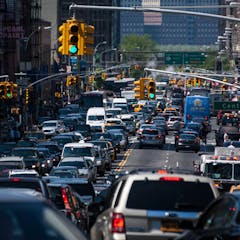
Articles on Smart cities
Displaying 81 - 100 of 100 articles

The 2016 articulation of an urban agenda assumes building more highways, railways and trams will produce better, more productive cities that somehow give everyone a job.

It’s easy to get excited about smart city technology – but we need to think through the human consequences.

The rhetoric of ‘smart cities’ is dominated by the economic, with little reference to the natural world and its plight. Truly smart and resilient cities need to be more in tune with the planet.

Governments too often hinder change, when instead they should aim to foster an organic innovation ecosystem. This is more about bottom-up innovation than top-down schemas.

Australia’s Smart Cities Plan largely conveys a limited role for people: they live, work and consume. This neglects the rich body of work calling for better human engagement in smart cities.

In an age of data-driven urban science, we need to remember how Jane Jacobs gave voice to the multiple languages, meanings, experiences and knowledge systems of a vibrant city.

Cities are home to many different people who will not always agree. We need to learn to embrace public debate as an ongoing, constructive process for working through diverse views and values.

The Turnbull government’s cities policy is the latest incarnation of ‘the-Commonwealth-knows-best’ approach, with little regard for whether urban issues are best resolved at the metropolitan level.

Using elements of game play, we can create incentives for people to change how and when they make various transport choices in ways that enable the whole system to work better.

With a strategic plan adopted, it not only shows where development should be avoided but clears the way for development in other areas. So Perth needs to get it right.

The budget paints a picture of higher debt, little relief for growing cities crying out for infrastructure investment, and no detail of how City Deals might work to fix this.

The discussion paper makes all the right noises, but the proof of the policy will be in the detail of partnership arrangements and implementation structures, and in how new money is used.

The Turnbull government sees the ‘City Deal’ as a way for ‘smart cities’ to drive innovation and growth. But what is the value proposition behind this UK concept and how might it work in Australia?

With the failures of past planning now apparent, the unruly threat of a damaged and depleting planet is ushering us toward a fourth era of urban restructuring. What might City v4.0 look like?

In his ministerial reshuffle earlier this year, Malcolm Turnbull made Angus Taylor, an up-and-coming Liberal MP, the assistant minister for cities and digital transformation.

If smart cities run on big data and algorithms that channel only ‘relevant’ information and opinions to us, how do we maintain the diversity of ideas and possibilities that drives truly smart cities?

How well does the ‘smart’ city respond to the devastating scale and impact of urban heat threats such as bushfires and heatwaves?

In areas as diverse as transport, health or commerce, the answer to many problems starts with open data.

India’s smart cities mission is evolving – and it has some issues to iron out, if it’s to work out for the good of all.

Worldwide, everyone’s moving to the city - we need to work smart to stay moving and avoid global gridlock.





